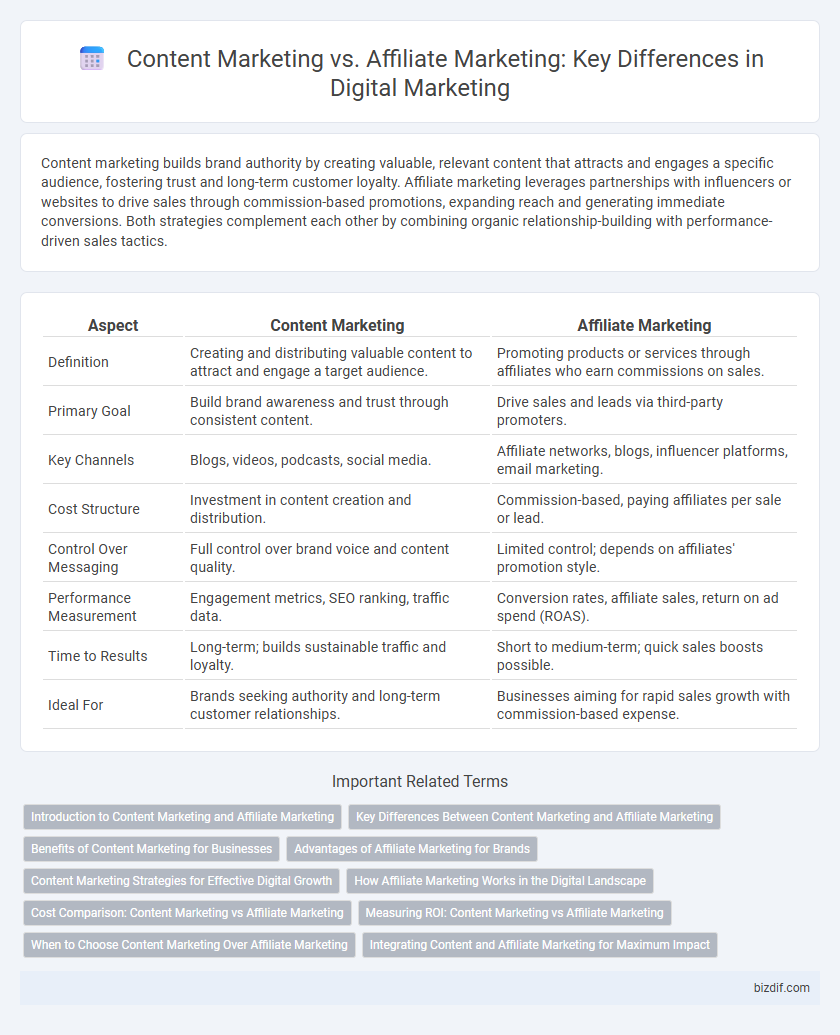Content marketing builds brand authority by creating valuable, relevant content that attracts and engages a specific audience, fostering trust and long-term customer loyalty. Affiliate marketing leverages partnerships with influencers or websites to drive sales through commission-based promotions, expanding reach and generating immediate conversions. Both strategies complement each other by combining organic relationship-building with performance-driven sales tactics.
Table of Comparison
| Aspect | Content Marketing | Affiliate Marketing |
|---|---|---|
| Definition | Creating and distributing valuable content to attract and engage a target audience. | Promoting products or services through affiliates who earn commissions on sales. |
| Primary Goal | Build brand awareness and trust through consistent content. | Drive sales and leads via third-party promoters. |
| Key Channels | Blogs, videos, podcasts, social media. | Affiliate networks, blogs, influencer platforms, email marketing. |
| Cost Structure | Investment in content creation and distribution. | Commission-based, paying affiliates per sale or lead. |
| Control Over Messaging | Full control over brand voice and content quality. | Limited control; depends on affiliates' promotion style. |
| Performance Measurement | Engagement metrics, SEO ranking, traffic data. | Conversion rates, affiliate sales, return on ad spend (ROAS). |
| Time to Results | Long-term; builds sustainable traffic and loyalty. | Short to medium-term; quick sales boosts possible. |
| Ideal For | Brands seeking authority and long-term customer relationships. | Businesses aiming for rapid sales growth with commission-based expense. |
Introduction to Content Marketing and Affiliate Marketing
Content marketing focuses on creating and distributing valuable, relevant content to attract and engage a target audience, driving brand awareness and customer loyalty. Affiliate marketing involves promoting products or services through affiliates who earn commissions for generating sales or leads, leveraging influencer reach and performance-based strategies. Both approaches aim to increase online visibility and conversions but differ in execution and stakeholder involvement.
Key Differences Between Content Marketing and Affiliate Marketing
Content marketing centers on creating valuable, relevant content to attract and engage a target audience, enhancing brand awareness and customer loyalty. Affiliate marketing involves promoting third-party products or services through unique affiliate links, earning commissions on generated sales or leads. The key difference lies in content marketing's focus on audience education and long-term relationship building, while affiliate marketing prioritizes performance-based monetization through partnerships.
Benefits of Content Marketing for Businesses
Content marketing enhances brand authority by providing valuable, relevant information that builds trust and long-term customer relationships. It drives organic traffic and improves SEO rankings, increasing visibility and generating high-quality leads at a lower cost. Businesses benefit from sustained audience engagement and higher conversion rates due to personalized, informative content tailored to their target market.
Advantages of Affiliate Marketing for Brands
Affiliate marketing offers brands a cost-effective way to expand their reach by leveraging affiliate partners who drive targeted traffic and sales through performance-based commissions. It enhances brand visibility across diverse platforms and taps into niche audiences that may be difficult to access through traditional marketing channels. This model reduces upfront marketing expenses and minimizes risks while providing measurable ROI through tracking and analytics.
Content Marketing Strategies for Effective Digital Growth
Content marketing strategies for effective digital growth focus on creating valuable, relevant, and consistent content to attract and engage a clearly defined audience, thereby driving profitable customer action. Utilizing SEO optimization, storytelling, and multimedia content enhances brand authority and organic reach across platforms like blogs, social media, and email campaigns. This approach contrasts with affiliate marketing by prioritizing direct audience engagement and long-term brand loyalty rather than solely leveraging third-party partnerships for sales.
How Affiliate Marketing Works in the Digital Landscape
Affiliate marketing in the digital landscape operates by connecting advertisers with publishers who promote products or services through unique affiliate links, earning commissions for each sale or lead generated. This performance-based model leverages tracking technologies such as cookies and affiliate dashboards to monitor user activity and attribute conversions accurately. By integrating affiliate partnerships across websites, social media, and email campaigns, businesses amplify their reach while affiliates optimize content to drive targeted traffic and maximize revenue.
Cost Comparison: Content Marketing vs Affiliate Marketing
Content marketing generally requires a higher upfront investment in creating quality articles, videos, and SEO optimization, but offers long-term organic traffic growth with sustained audience engagement. Affiliate marketing involves lower initial costs, primarily commissions paid upon successful conversions, making it a performance-based expense with less financial risk. Businesses often find content marketing more cost-effective over time due to enduring brand presence, whereas affiliate marketing provides immediate ROI linked directly to sales generated.
Measuring ROI: Content Marketing vs Affiliate Marketing
Measuring ROI in content marketing involves analyzing metrics such as engagement rates, lead generation, and customer lifetime value to assess long-term brand growth and audience trust. Affiliate marketing ROI is typically measured through direct conversions, click-through rates, and commission-based sales, offering clearer insights into immediate revenue impact. Businesses often choose content marketing for sustained brand equity while leveraging affiliate marketing for rapid sales tracking and performance-based payouts.
When to Choose Content Marketing Over Affiliate Marketing
Content marketing is the preferred strategy when building long-term brand authority and fostering direct customer relationships through valuable, original content tailored to target audiences. It delivers sustainable organic growth by enhancing search engine rankings and establishing expertise, ideal for companies seeking control over messaging and customer data. Affiliate marketing is less suitable when brand integrity or consistent content quality is crucial, as it depends on third-party affiliates promoting products for commission.
Integrating Content and Affiliate Marketing for Maximum Impact
Integrating content marketing and affiliate marketing amplifies reach and drives higher conversion rates by leveraging valuable, targeted content to attract and engage prospects while seamlessly promoting affiliate products within that content. Strategic collaboration between content creators and affiliate partners ensures authenticity and trust, enhancing user experience and boosting affiliate revenue. Data-driven insights and SEO optimization further maximize the impact by aligning content topics with high-performing affiliate offers tailored to audience preferences.
Content marketing vs Affiliate marketing Infographic

 bizdif.com
bizdif.com